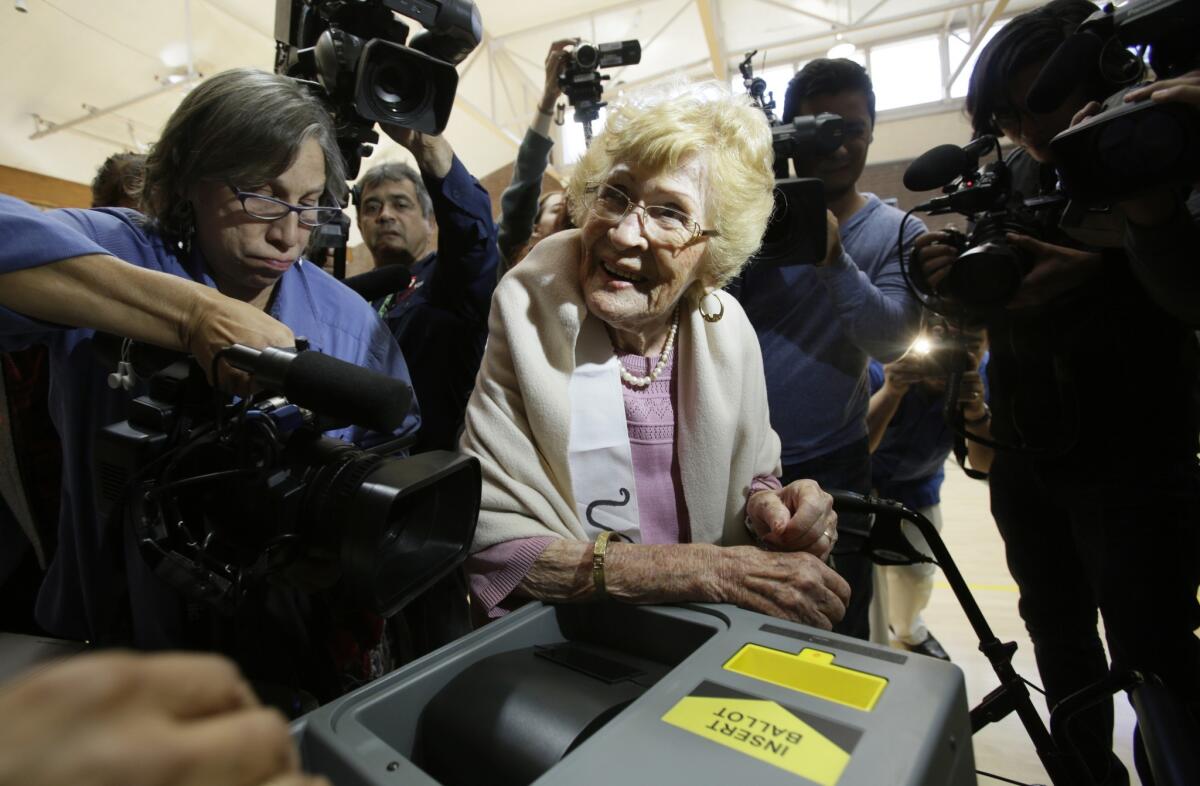Props. 1 and 2 pass; sentencing reform measure is leading

- Share via
A proposal for sweeping changes in California’s sentencing of drug and petty theft crimes was leading in early returns Tuesday as voters rejected a pair of healthcare initiatives that set off the year’s fiercest ballot measure campaigns.
Voters favored two initiatives championed by Gov. Jerry Brown: Proposition 1, a $7.5-billion water bond measure, and Proposition 2, which bolsters the state’s rainy day fund.
Proposition 47, the sentencing measure, pushed California to the forefront of the national drug decriminalization debate. It would make California one of only three states to treat possession of heroin, cocaine and methamphetamine as misdemeanor crimes, and the first to “de-felonize” those drugs.
Ten other states make drug possession a misdemeanor but only for first- and sometimes second-time offenders.
Under the measure, six crimes, including drug possession and theft of any property worth $950 or less, would be reduced from potential felonies to misdemeanors for all but the most violent criminals. About 7,000 prisoners already serving time for such crimes would be allowed to petition courts for reduced sentences, including release, according to a legislative analysis of 2013 data.
Legislative analysts predicted that about 40,000 offenders a year would qualify for lighter sentences under Proposition 47. Managers of Los Angeles County jails said they were prepared to immediately release offenders whose cases are reclassified by the courts as misdemeanors.
Prosecution of drug cases would move to city attorneys, whose offices currently handle zoning violations and traffic tickets.
Los Angeles City Atty. Mike Feuer has told city officials he needs more than $2.7 million a year to handle an expected 13,500 new cases.
The law would take effect immediately, but without initial funding for treatment programs. “It’s a big change and it might be messy for a while,” said Molly Rysman, who helps run a housing program for homeless individuals on L.A.’s skid row, “but criminalizing drug use has not worked for us either.”
The initiative is the outgrowth of a foundation-driven campaign to change the state’s sentencing laws, championed by California Endowment and New York hedge fund manager George Soros.
Proposition 45, which was soundly defeated, would have given the elected state insurance commissioner power to reject increases in premiums for some health insurance plans if deemed excessive.
Insurance commissioners can regulate health insurance rates in 35 other states. In California, the commissioner already is able to veto increases in auto and property insurance rates.
State Insurance Commissioner Dave Jones, a Democrat, was a proponent of the measure, as was the advocacy group Consumer Watchdog.
The “no” campaign, funded primarily by insurance companies, poured $57million into its effort to defeat the initiative, vastly outspending its supporters, who pulled in around $2.2 million.
Proposition 46, another healthcare-related measure, also failed.
It would have increased the state’s cap on medical malpractice damages for pain and suffering to $1.1 million from $250,000.
The initiative would have required hospitals to test their doctors for drug and alcohol use and mandated that physicians consult a statewide drug database before prescribing narcotic medications.
The measure’s foes held a significant cash advantage over proponents: more than $63 million to more than $10 million.
Doctors and insurers funded the opposition; attorneys backed it.
Also on Tuesday’s ballot was a tribal gambling measure, Proposition 48, allowing voters to weigh in on two compacts permitting the North Folk Rancheria of Mono Indians to build a new casino on land the tribe has bought near Madera, just north of Fresno. Other Native American tribes and competing gambling interests opposed the deal, saying it could set a poor precedent by allowing tribes to build casinos off reservations.
Voters rejected that measure.
@melmason
@paigestjohn
More to Read
Sign up for Essential California
The most important California stories and recommendations in your inbox every morning.
You may occasionally receive promotional content from the Los Angeles Times.















